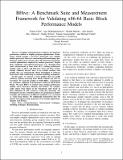BHive: A Benchmark Suite and Measurement Framework for Validating x86-64 Basic Block Performance Models
Author(s)
Chen, Yishen; Brahmakshatriya, Ajay; Mendis, Thirimadura C. Yasend; Renda, Alex; Atkinson, Eric Hamilton; Sykora, Ondrej; Amarasinghe, Saman P; Carbin, Michael James; ... Show more Show less
DownloadAccepted version (489.1Kb)
Open Access Policy
Open Access Policy
Creative Commons Attribution-Noncommercial-Share Alike
Terms of use
Metadata
Show full item recordAbstract
Compilers and performance engineers use hardware performance models to simplify program optimizations. Performance models provide a necessary abstraction over complex modern processors. However, constructing and maintaining a performance model can be onerous, given the numerous microarchi-tectural optimizations employed by modern processors. Despite their complexity and reported inaccuracy (e.g., deviating from native measurement by more than 30%), existing performance models-such as IACA and llvm-mca-have not been systematically validated, because there is no scalable machine code profiler that can automatically obtain throughput of arbitrary basic blocks while conforming to common modeling assumptions. In this paper, we present a novel profiler that can profile arbitrary memory-accessing basic blocks without any user intervention. We used this profiler to build BHive, a benchmark for systematic validation of performance models of x86-64 basic blocks. We used BHive to evaluate four existing performance models: IACA, llvm-mca, Ithemal, and OSACA. We automatically cluster basic blocks in the benchmark suite based on their utilization of CPU resources. Using this clustering, our benchmark can give a detailed analysis of a performance model's strengths and weaknesses on different workloads (e.g., vectorized vs. scalar basic blocks). We additionally demonstrate that our dataset well captures basic properties of two Google applications: Spanner and Dremel.
Date issued
2020-03Department
Massachusetts Institute of Technology. Computer Science and Artificial Intelligence Laboratory; Massachusetts Institute of Technology. Department of Electrical Engineering and Computer ScienceJournal
2019 IEEE International Symposium on Workload Characterization
Publisher
Institute of Electrical and Electronics Engineers (IEEE)
Citation
Chen, Yishen et al. "BHive: A Benchmark Suite and Measurement Framework for Validating x86-64 Basic Block Performance Models." 2019 IEEE International Symposium on Workload Characterization, November 2019, Orlando, Florida, Institute of Electrical and Electronics Engineers, March 2020. © 2019 IEEE
Version: Author's final manuscript
ISBN
9781728140452